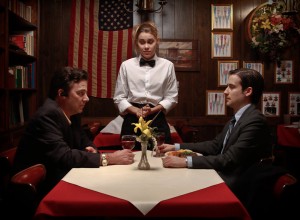While many young local filmmakers focus on comedies and horror movies, Mosley’s features and short films often aim for Art with a capital A, though with little pretension. Relying heavily on a combination of improv techniques, intense rehearsals, and meticulously planned camera shots, he locates drama in the quiet exchanges between people and the surprising ways that personalities can change under duress.
In his onscreen world, husbands spiritually disintegrate because they’ve failed to protect their wives, women find themselves questioning their very identities as they grow older, and always people struggle to hide what they really want to say to friends, lovers, and family.

“I’m fascinated by how much of any given conversation is real and how much of it is bullshit,” Mosley said. “Someone could be talking to you about ice cream, when what they’re really doing is hitting on you.”
Even his first short films out of UTA were startlingly mature and stylistically diverse. He showed an impressive ability to direct actors with a wide range of skill levels, from nonprofessionals to people with extensive theater and film training. Many of the shorts were screened as official selections at area film festivals including the Dallas Video Festival and the Lone Star International Film Festival.
The highly theatrical Little Boy (2006), shot on a soundstage, compares the creation of the atomic bomb with the birth of a Manhattan Project scientist’s first child. In sharp contrast, Leave (2007) is a largely improvised study of a young Iraq war veteran returning home to face his brother, mother, and best friend. The veteran rarely speaks; we must assemble his story from scraps of family members’ conversations.
Full of overlapping dialogue and quick, anxious cuts, Lion’s Den (2007) features a wild, profanity-laced conversation about sexual conquests among a group of male friends preparing to hit a strip club. The scene turns vicious and almost violent when it’s discovered that one of the friends has sexually relieved himself while in the bathroom.
Mosley segued quickly from these post-college works to his first feature film Hold (2009), co-written with longtime friend and lead actor Robby Storey. Like Lion’s Den, it explores men’s attitudes toward women’s sexuality and the vast chasm between gender experiences, albeit in a more restrained style. When his wife is sexually assaulted, a husband is forced to confront his own lingering powerlessness amid feelings that he has failed her as a protector. Hold is a powerful minimalist drama about thwarted communication and regret, full of long, excruciating pauses and fumbling half-conversations.
Andrew Sensenig, a full-time actor who divides his time between Dallas and Los Angeles, had a feature role in Hold. His long list of professional credits include small roles in movies like W. and I Love You Phillip Morris and TV shows like Friday Night Lights. He has co-starred with Mosley in at least half a dozen small North Texas film projects.
“Frank operates from a unique skill set as a director because he’s a very intuitive actor himself,” Sensenig said. “When he’s directing, he focuses much more on trying to help you understand the character rather than just telling where you to stand and how to say something. He’s very collaborative. With him, it’s much more about helping you share the story than anything technical.”
Johnston said that as a director, Mosley is “all about personal artistic expression. His movies toe the line between character-driven and experimental work. I’d put him in the tradition of Cassavetes and Joe Swanberg — these filmmakers who get together with their friends and do whatever it takes to get their movies made.”
In Hold, Mosley said, “I wanted to make a restrained, muted first feature set in real time that would make audiences squirm.” Though it wasn’t accepted at any major national film festivals, the movie screened at the Lone Star International Film Festival here in Fort Worth and received a short engagement at the reRun Theater, a New York venue that specializes in low-budget American cinema.
His upcoming second feature film, Her Wilderness (formerly titled Hot/Cold), is typically ambitious. Still in post-production, the movie is a non-linear, non-narrative character study featuring four actresses of different ages who may or may not be playing the same woman at various stages of her life. The scenes alternate between cold, stark interiors and naturalistic exteriors. The movie is intended to be screened as both an art gallery installation and a feature film. Right now, Mosley is crafting a final edit and sound design, readying it for film festival submission deadlines in the fall.
The young director acknowledged that his sometimes-esoteric approach might hinder his chances of reaching major audiences, studios, and film investors. “I feel like the kind of films I want to make are very ‘art house,’ ” he said. “But I enjoy all kinds of movies. People wouldn’t necessarily know [from watching Hold or Her Wilderness] that I have scripts for a comedy and a horror film in my drawer.
“Hopefully, they can watch Hold and at least say, ‘He knows how to tell a story with the camera.’ ”
********











Keep up the good work, Frank!! We’re rootin’ for you 🙂
April Lulabee and (all) her cats.